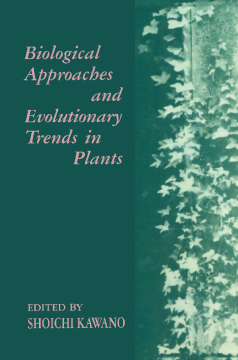
Additional Information
Book Details
Abstract
Biological Approaches and Evolutionary Trends in Plants is a collection of papers presented at the Fourth International Symposium of Plant Biosystematics held on July 10-14, 1989 in Kyoto, Japan. Contributors, some are world's leading plant biologists, discuss the findings in evolutionary biology and issues in plant biosystematics in light of the evidence and ideas brought forward at various levels of biological organization, from molecule to cell, individual, population, species, and community levels.
This volume is organized into four sections encompassing 22 chapters and begins with an overview of discoveries concerning parapatric differentiation of weed populations, including adaptive evolution in herbicide resistant biotypes and complex evolutionary patterns in weed-crop complexes of various groups. The next section explores molecular approaches in plant biosystematics, focusing on amino acid sequencing of proteins; restriction-site variations of cpDNA, mitDNA, rDNA, etc.; and chromosome-banding patterns revealed by differential staining. The discussion shifts to a wave of research in plant population biology and evolutionary ecology since the 1970s and its impact on biology and biosystematics. The book considers various aspects of reproductive biology and evolutionary changes in significant reproductive parameters and attempts to demographically quantify these parameters. The final chapter is devoted to the use of functional phylogenetic systematics for predictive ecology.
This book will be of interest to plant biologists and scientists and researchers in fields such as biochemistry, botany, microbiology, ecology, and evolutionary biology.
